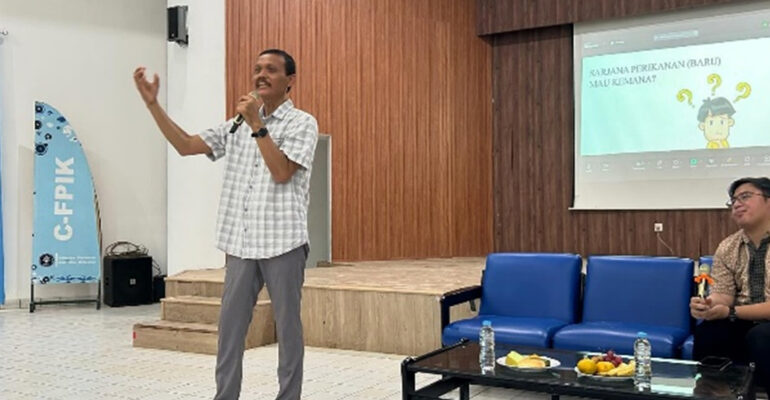Successful Fisheries Practitioner Hari Purnomo Enriches the Knowledge of MSP Students of IPB University

The Department of Aquatic Resources Management (MSP), Faculty of Fisheries and Marine Science (FPIK) IPB University presented alumni who were successful in the fisheries business at a public lecture at the Sumardi Sastrakusumah Auditorium, IPB Dramaga Campus.
This public lecture was attended by MSP students of batches 58, 59, and 60. The presence of students to this public lecture was intended to add insight into the role of aquatic resource management science from practitioners who are indeed struggling in the field of fisheries.
Dean of FPIK IPB University, Prof Fredinan Yulianda said that Hari’s experience as a successful fisheries practitioner was very valuable in enriching the knowledge of the students. Chairman of the MSP Department, Prof Hefni Effendi also appreciated Hari’s return to his alma mater after a 35-year career in the fisheries sector.
A number of MSP lecturers were also present at the public lecture, listening to Hari Purnomo’s presentation who told a lot about his experience who likes to do light experiments and sometimes out of the box in overcoming the fisheries problems experienced.
“Through trial and error, many problems in shrimp hatchery management and fisheries in general can be overcome. Fisheries management in public waters is also being developed,” says Hari, who now manages PT Summa Benur.
Hari explains a lot about the role of plankton as natural food for shrimp. The type and size of phytoplankton and zooplankton also play a significant role in determining the survival of shrimp seed life.
In addition, he continued, bacteria play an important role in maintaining water quality. Through isolation experiments of bacterial aggregates from mangrove ecosystems, it was proven that bacteria taken from the waters around the location of fishery activities (hatcheries) can maintain the health of the reared seeds by maintaining stable water quality.
Furthermore, the role of oxidizers in maintaining water quality so that it is always suitable and comfortable for aquatic biota is also presented. Optimum pH regulation is also very necessary in determining the success of fry fisheries.
The dynamics of Total Organic Matter (TOM) content is often a problem that haunts seeds fisheries that must be overcome. Through a number of techniques, ranging from efforts to maintain pH so that it is always alkaline, maintain the content of organic matter to remain stable, the availability of nutrients that are always optimum, stable dissolved oxygen levels, the availability of natural food with a size that matches the mouth opening of the reared seedlings, Hari is successful in maintaining the survival of shrimp seeds. In fact, he admitted, he never failed in raising the seeds.
Furthermore, Hari also motivates and inspires students to take responsibility for their own future by exploring knowledge as much as possible during college, both through classroom learning, learning in the field, and also by exploring themselves via surfing scientific journals on digital platforms.
“I am currently trying to raise vaname shrimp (Litopenaeus vannamei), which is a seawater shrimp, into freshwater rearing media. Hopefully one day vaname shrimp can grow well in freshwater and can spawn,” Hari said.
The original habitat of vaname shrimp is subtropical waters. However, it is currently widely cultivated in Indonesia. Vaname shrimp carry out their growth cycle starting from eggs, mysis, post larvae, juveniles to adults. Vaname shrimp include catadromous animals, migrating to high salinity waters to mature sex, mate, and lay eggs. Then return to estuary waters to grow and develop. (*/Rz) (IAAS/RUM)



